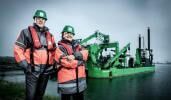4
As the ‘Great Egyptian dream’ is now in full swing, Atlas Professionals are busier than ever providing a diverse range of personnel for the Suez project. One of those professionals is Offshore Survey’s Barry Sinclair, a Senior Hydrographic Surveyor who was asked to join the project towards the end of last year. Barry talks to Atlas about his experience working on the biggest dredging project of the year.
Initiating a Topographic Survey
“I heard that Boskalis were looking for a Senior Hydrographic Surveyor for the Suez Canal project, Account Manager Gemma Tiffin from Atlas then contacted me about the contract. She and the logistics team organised everything including my travel arrangements to Egypt.”
A consortium of four of the largest dredging companies in the world is currently dredging another canal parallel to the Suez. The new canal will allow vessels to simultaneously pass one another, reducing waiting and transit times. More importantly this $1.5 billion project will result in the new Suez Canal in becoming the main trade transportation route for Europe and the Middle East.
Since joining the project, Barry was asked to take the lead as the Consortium’s Chief Topographic Surveyor. “My Main responsibility is for the Topographic survey of the New Suez Canal. A major part of this involves coordinating the survey team which can be more than 10 people, to collect the survey data in the pre-dredged areas. In addition to this, I am responsible for installation and maintenance of base stations, benchmarks and Topographic equipment.
The most important part of this is to keep ahead of the dredgers in all areas so that we are not missing any data before the dredgers cut away that particular section of the new canal. This is often difficult as we have more than 20 dredgers on site working 24 hrs a day and they will only stop dredging for scheduled maintenance or in the case of a breakdown. On a day to day basis my job involves coordinating the Surveyors, vehicles and drivers, food, HSE representatives, and various client representatives to be in the correct places at the correct times so that we may continue with the survey in a timely and efficient manner. ”
The Suez’s Logistical Challenges
With a project of this size, Barry has encountered a few logistical problems with his team. “There are often difficulties and challenges for a number of reasons: Logistically, people are not all staying in the same place and mobile phone reception is not great. The size of the project is approx 35km in length and so provides obvious spatial challenges. Also, when moving around the site our movements are strictly controlled and monitored by the Egyptian security services so that we are kept safe.”
To conduct a survey over this vast amount of land, Barry and his team also find the work physically demanding. “High fitness and being comfortable in shallow water areas is essential as you may be walking up to 6km per day through deep mud/sand, or sometimes more than 12km per day through the desert when surveying the reclamation areas. When we’re walking in the flooded pre-dredged areas we are using Trimble DGPS "manpacks" to get the correct survey data (XYZ). If the conditions are too muddy, sandy or deep then we have to employ special survey techniques such as surveying from rowing boats or using a Zboat - a small remote control single beam boat.
Although the work is tough, it is also extremely enjoyable as I really like to push myself and my team each day to ensure our part of the project is completed as quickly and safely as possible."
“No time to waste at the Suez”
With the completion date now five months away, Barry has learned to cope with the pressures of this demanding project. “With a project such as this you’ve just got to get on with it, work as hard as possible and keep the quality of work to a high standard. The key thing is to organise your team correctly in advance and be as efficient as possible. If you don’t, you just waste time and there isn’t any time to waste at the Suez.”
As with every job in the offshore industry, every professional has to be prepared for the unexpected. “Every job is different really,” explains Barry, “you never can fully prepare for how a job will turn out. My advice for anyone who is looking to pursue a career in this industry is to get a degree in their relevant subject; Hydrography Masters would be good. I would suggest learning how to troubleshoot things in a logistical manner, and try to learn as many practical skills as possible whether it’s learning how to use a multimeter properly, soldering an RS232 cable or setting up networks for interfacing survey systems. It’s very important to build up a good knowledge about how things work; this will help you in the long run. Sometimes you may have technical support that will be able to help you but in this industry you have to learn to be independent and this will help you to develop within your career.”
To view more jobs at the Suez Canal please click here and visit our job page to find out more.
.png)
.png)


